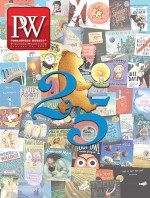On January 17, former U.S. register of copyrights Maria Pallante officially joins the Association of American Publishers as president and CEO, replacing the retiring Tom Allen. In announcing Pallante’s appointment, Elsevier’s Y.S. Chi, chairman of the AAP board of directors, called her a “forward-thinking leader” who has earned “the deep respect of Congress, as well as intellectual property experts around the world.” Without question, Pallante is a copyright policy heavyweight.
At the U.S. Copyright Office, Pallante managed more than 400 employees, and over her five years as register she delivered numerous policy studies on thorny topics facing authors and publishers in the digital age, including orphan works and mass digitization. Most prominently, she gave a set of lectures that helped to spur the recent congressional review of U.S. copyright law, which she dubbed, “The Next Great Copyright Act.” Policy credentials aside, Pallante’s experience at the Copyright Office means she also knows intimately how the machinery of copyright administration works (or, as the case may be, doesn’t work).
Pallante has also cultivated deep ties to the entertainment industry, where she is seen as a strong ally. In October, when librarian of Congress Carla Hayden abruptly removed her as Register of Copyrights, the music industry, in particular, rose up in protest, with a number of editorials and articles suggesting her ouster was a Google-led conspiracy. It wasn’t. But the outcry speaks to how deeply the music business valued her work.
Pallante may not be as colorful an advocate for publishers as the legendary MPAA chairman Jack Valenti was for Hollywood. But her name certainly rings out.
Pallante, however, has her critics. The tech industry, public watchdog groups, and the library community, for example, all viewed Pallante’s leadership of the Copyright Office as biased toward the content industries, out of step with the public, and increasingly at odds with the courts.
Last September, a month before she left, the advocacy group Public Knowledge issued a scathing report on Pallante’s Copyright Office, dubbing it a “captured” agency. Copyright’s direct aim is “promoting the public good,” the report stated, but the Copyright Office under Pallante “has tended to view copyright owners as its real constituency.” Pallante’s appointment at AAP also seems to buttress one of the major complaints in the report—a so-called revolving door for personnel between the Copyright Office and the content industries that lobby it.
Still, sources insist that what cost Pallante her job at the Copyright Office was her position that the Copyright Office should be removed from the Library of Congress and made an independent agency. How could the librarian of Congress lead the Copyright Office forward with a subordinate pushing for independence? “If Congress wants to remove the Copyright Office, it can do so,” one source explained to PW, on background. “But, for now, it is part of the Library of Congress.”
In the long term, it’s unclear what will happen with the Copyright Office, and Hayden has yet to hire a new register. But in the short term, it sure looks like Pallante, as head of AAP, will be dealing with a register of copyrights who holds a different view of copyright, and of the Copyright Office, than she does.
When Tom Allen took the helm of AAP in April 2009, e-books accounted for about 1% of industry revenues, he noted. Over the next three years, Amazon spiked that to nearly 30%, Apple unveiled the iPad, the settlement in the Google book search lawsuit was rejected by the courts, and the Department of Justice filed antitrust charges against five major publishers over e-book pricing.
“Change was just coming so fast,” Allen said, looking back at the early days of his tenure. “That first year on the job, I had to learn a lot. I remember feeling that publishers were having to develop relationships with companies like Amazon and Apple and just hoping they made sense 10 years later. It’s like I was here for the first eight years of the digital transformation, the major components at least.”
What challenges loom for Pallante? Well, in terms of technological change, things seem to have stabilized for publishers. But with the incoming Trump administration, wild cards abound—how will Trump approach international trade deals, for example? How will his policies affect the economy? What about Amazon? His hostility toward the media? And, with the first copyright proposals starting to come out of Congress, where does Trump stand on Pallante’s strong suit, IP issues?
“We just don’t know,” Allen conceded. But, he added, “I don’t think we will hear much from him on copyright for a while.”



 Volume 264
Issue 03
01/16/2017
Volume 264
Issue 03
01/16/2017





